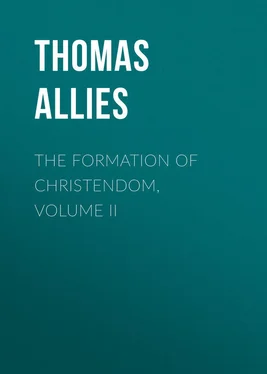Thomas Allies - The Formation of Christendom, Volume II
Здесь есть возможность читать онлайн «Thomas Allies - The Formation of Christendom, Volume II» — ознакомительный отрывок электронной книги совершенно бесплатно, а после прочтения отрывка купить полную версию. В некоторых случаях можно слушать аудио, скачать через торрент в формате fb2 и присутствует краткое содержание. Жанр: foreign_antique, foreign_prose, на английском языке. Описание произведения, (предисловие) а так же отзывы посетителей доступны на портале библиотеки ЛибКат.
- Название:The Formation of Christendom, Volume II
- Автор:
- Жанр:
- Год:неизвестен
- ISBN:нет данных
- Рейтинг книги:3 / 5. Голосов: 1
-
Избранное:Добавить в избранное
- Отзывы:
-
Ваша оценка:
- 60
- 1
- 2
- 3
- 4
- 5
The Formation of Christendom, Volume II: краткое содержание, описание и аннотация
Предлагаем к чтению аннотацию, описание, краткое содержание или предисловие (зависит от того, что написал сам автор книги «The Formation of Christendom, Volume II»). Если вы не нашли необходимую информацию о книге — напишите в комментариях, мы постараемся отыскать её.
The Formation of Christendom, Volume II — читать онлайн ознакомительный отрывок
Ниже представлен текст книги, разбитый по страницам. Система сохранения места последней прочитанной страницы, позволяет с удобством читать онлайн бесплатно книгу «The Formation of Christendom, Volume II», без необходимости каждый раз заново искать на чём Вы остановились. Поставьте закладку, и сможете в любой момент перейти на страницу, на которой закончили чтение.
Интервал:
Закладка:
One other turpitude the Asiatic idolatry added to the Greek and Roman forms. By consecrating the sexual relations themselves in one male and one female god, they effected this crowning connection of idolatry with immorality that unchaste acts became themselves acts of sacrifice, and so of worship. 23 23 See Heidenthum und Judenthum , p. 398. Herodotus, i. 199. Baruch, vi. 42-3.
This is the strange perversion borne witness to by Herodotus, and corroborated by the prophet Jeremiah. A great seat of this worship was the city of Hierapolis, in Syria, where was one of the most magnificent temples of the ancient world, dedicated to Derketo, and rich with the offerings of Arabians, Babylonians, Assyrians, Phœnicians, Cilicians, Cappadocians, and all nations of the Semitic tongue. Nor was this worship confined to the East, for hence, as from a centre, the adherents of the Syrian goddess spread themselves in begging troops over the provinces of the empire. And the worship of Venus at Eryx, and other places in the West, with the thousands of female priestesses dedicated to it, reproduced the same abomination.
As the great result of all that we have said, we find the notion of sanctifying the human will absent from the religious rites of the polytheistic idolatry in all its forms. To this corresponded the absence of the notion of holiness in the gods. And this leads us finally to the remarkable character which defines it as a whole. This worship was throughout a corruption, 24 24 See S. Athan, con. Gentes , 5-9. In like manner S. Theophilus, lib. i. ad Autolyc. c. 2.
the spoiling, that is, of something good; a turning away from the better to the worse. The worship itself had been originally good. The corruption lay in the alteration of the quality and the object of the worship. Worship had been implanted in man, and prescribed to him. It was at once the need of his nature and the command of Him who gave that nature. It had for it, first, positive institution, and then tradition and custom, and throughout, the conscience, the reason, and the heart of man. The reason of man ever bore powerful witness to the unity of the Godhead; the breaking up of that unity, as exhibited by this idolatrous polytheism, in contradiction to the original prompting and continued witness of the reason, is a very strong proof of that moral corruption in the will which first generated it, which continued its existence, and which, while multiplying, degraded its forms from age to age. But man was free to decline from the good in which he had been placed. The corruption which was left in his power he exerted; he changed the quality of the service, and the person served. The productive cause of idolatry on the part of man was the soul of man turning away from the notion of a good and holy Creator, the contemplation of whom was its present support and future reward, to visible things. Of these things the chief were bodily pleasures. Thus this corruption of the soul, in process of time, and continually becoming worse, produced this whole pantheon of gods, originally the creation of its own lusts, and subsisting as a perpetual food and support of those lusts. For this cause it had broken up the one perfect idea of God the Creator and Ruler of all persons and things into a multitude of gods, whose functions became more and more divided, until the ether, the air, the earth, and the water swarmed with these supposed beings, which took possession even of wood and stone, dwelling in the statues erected to them; and every desire which the soul in its corruption could entertain had its corresponding patron, helper, and exemplar. In this descending course cause and effect were perpetually reacting on each other, and as the corruption of the human soul had generated these gods, so their multiplication and degradation intensified its corruption from age to age. 25 25 In order to form a notion how far this division of gods could descend, and what an incredible depth of turpitude it reached, see De Civ. Dei , l. vi. c. 9, de officiis singulorum deorum. Its foulness prevents any adequate representation of it.
5. But this was not all. If corrupt affection in man himself, if the charm of representing the unseen objects of worship in visible characters of wood or stone, if, finally, the ignorance of the true God, together with the beauty of the creature substituted for Him, 26 26 See S. Thomas, Summa , 2, 2, q. 94, a. 4.
were the disposing causes within man to idolatry, there was a cause outside of him which must not be forgotten. When we look upon this idolatry, occupying not one country or race, but all; not merely bewildering savage or uncivilised man, but throned in the chief seats of the world's choicest civilisation; when we look upon its endlessly divergent forms, its palpable contradictions, its cherished or commanded immoralities, its crowd of debasing, irrational, heterogeneous superstitions, its cruelty, sensuality, and fearfulness, all these being no less an insult to man's reason than a derogation from God's majesty, who is there that does not feel this to be the strangest and most astonishing sight which history presents to man? And yet there is a unity which runs through it all, and stamps it with a double mark. Not only is it a service due from man to God, which is paid by him to the creature rather than to the Creator, 27 27 Of this whole polytheism in the mass S. Paul pronounces the judgment: Οἵτινες μετήλλαξαν τὴν ἀλήθειαν τοῦ Θεοῦ ἐν τῷ ψεύδει, καὶ ἐσεβάσθησαν καὶ ἐλάτρευσαν τῇ κτίσει παρὰ τὸν κτίσαντα. Rom. i. 25. And the Psalmist adds: Ὅτι πάντες οἱ θεοὶ τῶν ἐθνῶν δαιμόνια; ὁ δὲ Κύριος τοὺς οὐρανοὺς ἐποίησεν. Sept. xcv. 5. See also Ps. cv. 37.
but more especially it is that service paid by man to God's enemies, the fallen angels. These it is who have assumed the mask of dead men; these it is who within the sculptured forms of Jupiter, Juno, Mars, and Venus, of Baal and Derketo and Mylitta, of Anubis and Serapis, of Thor and Woden, and so many more, receive man's adoration, and rejoice above all things in possessing his heart. These it is who have seduced him by exhibitions of visible beauty, have lain in wait for him by fountain, forest, and field, and filled the groves and high places with the charms which best pleased him under the name of worship; or have promised to disclose future things to him; or, again, have harrowed his soul with phantasms and terrors of the unseen world. These incoherent systems; these deities, whose functions ran into and athwart each other; these investing of human passions, and even unnatural and monstrous vices, with immortality and terrible power; these rivals ever quarrelling with each other, and jealous for the possession of man's homage, all serve the purpose of those behind the scenes, are puppets under their command, and have a common end and result in the captivity of their victim. More even than this; while they seem disunited and contradictory, they are really one, marshalled by the power, directed by the mind, held in the hand of him who is called “the ruler of this world,” “the power of darkness,” “the might of the enemy,” who “holds the power of death,” “the ancient serpent, who leads into error the whole world,” “that malignant one in whom the whole world is lying,” “the prince of the power of the air, the spirit who now works in the children of disobedience,” who musters “the principalities, the powers, the world-rulers of this life's darkness, the spirits of wickedness in ethereal places,” to serve him in his conflict with man's flesh and blood; in fine, for S. Paul's language goes one point even beyond that of his Master, and terms him not merely the ruler, but “the God of this world;” 28 28 See John xii. 31; xiv. 30; xvi. 11; Luke xxii. 53; x. 19; Apoc. xii. 9; Heb. ii. 14; 1 John v. 18; Ephes. vi. 12; ii. 2; 2 Cor. iv. 3.
that is to say, this manifold idolatry is the establishment of his kingdom, the enthronement of his godhead over men, the mark of their captivity and prostration before him.
Интервал:
Закладка:
Похожие книги на «The Formation of Christendom, Volume II»
Представляем Вашему вниманию похожие книги на «The Formation of Christendom, Volume II» списком для выбора. Мы отобрали схожую по названию и смыслу литературу в надежде предоставить читателям больше вариантов отыскать новые, интересные, ещё непрочитанные произведения.
Обсуждение, отзывы о книге «The Formation of Christendom, Volume II» и просто собственные мнения читателей. Оставьте ваши комментарии, напишите, что Вы думаете о произведении, его смысле или главных героях. Укажите что конкретно понравилось, а что нет, и почему Вы так считаете.












